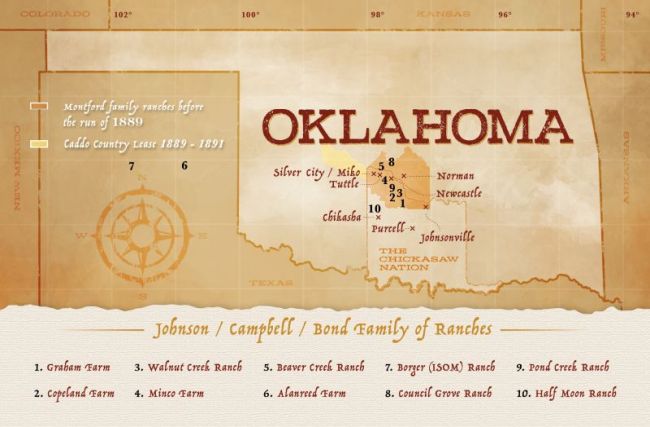In the time of Indian Territory, after the removal of First Americans to the west of the Mississippi, no family has figured more conspicuously than that of Johnson, prominently represented by Edward Bryant (E.B.) Johnson. In 1886, E.B. Johnson established his ranch on Pond Creek, three miles from the South Canadian River. [1]
Before that, Nute Burney had persuaded Montford Johnson, E.B. Johnson’s father, to let him start a ranch. He selected a range on Pond Creek. [2, p. 94] At the Pond Creek encampment, they found that the water moccasins were about to over run the place. Montford Johnson instructed Burney to change his headquarters immediately [2, p. 97].
Located in south-central Grant County, Pond Creek is situated slightly east of the junction of U.S. Highways 60 and 81 (Chisholm Trail Highway). Approximately one mile north of present Pond Creek was the Pond Creek stage station on the Chisholm Trail. In 1889-90, the Chicago, Kansas and Nebraska Railway (later the Chicago, Rock Island and Pacific Railway) constructed a line from southern Kansas to Minco that passed through the future townsite.

Map courtesy of the Chickasaw Nation
Beginning in 1879, settlers called Boomers clamored for the opening of the area to settlement. Between 1879 and 1884, Charles C. Carpenter and David L. Payne led several groups on excursions into the region to establish colonies. Although their efforts were thwarted, the publicity that was generated brought the situation to national attention, and the Cherokee Outlet was opened to non-Indian settlers on Sept.16, 1893.
Lying south of the Salt Fork of the Arkansas River, Pond Creek was a trade center for a surrounding agricultural area where farmers engaged in general farming and stock raising. In 1902, the community had two newspapers, the Grant County News and the Grant County Republican. Professional occupations included a dentist, several lawyers and an architect. The Saddle-Rock and Shamrock restaurants advertised as short-order houses, and S. W. Burr owned the Pond Creek Cigar Factory. By 1909, the Congregational, Methodist and Presbyterian churches had been organized. Area residents supported two banks, a flour mill and several grain elevators. The town had electricity, water works and a fire department. In 1918, two veterinarians, two horse breeders, a wagon maker, a harness maker, a blacksmith, and a dealer in horses and mules served the local community. By 1931, Pond Creek had 311 telephone connections, a library, city parks and an airfield. In the mid-1940s, the town had one bank, one weekly newspaper and five churches, representing five denominations. In the 1940s and 1950s, Pond Creek continued to have businesses such as a blacksmith, a hatchery, and feed and implement stores serving the rural community. [3]
[1] Rootsweb, "Rootsweb," [Online]. Available: https://bit.ly/3EMLjYW. [Accessed 5 11 2021].
[2] Johnson, Neil R, The Chickasaw Rancher, Boulder: University Press of Colorado, 2001.
[3] Knight, Janie, "Oklahoma Historical Society," [Online]. Available: https://bit.ly/3BQBXJV. [Accessed 31 8 2021].